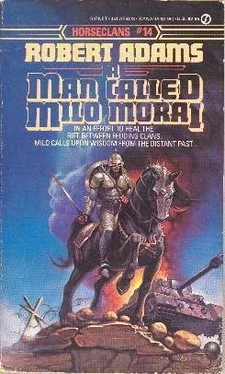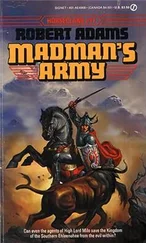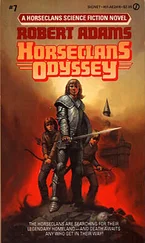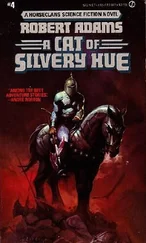Robert Adams - A Man Called Milo Morai
Здесь есть возможность читать онлайн «Robert Adams - A Man Called Milo Morai» весь текст электронной книги совершенно бесплатно (целиком полную версию без сокращений). В некоторых случаях можно слушать аудио, скачать через торрент в формате fb2 и присутствует краткое содержание. Жанр: Фантастика и фэнтези, на английском языке. Описание произведения, (предисловие) а так же отзывы посетителей доступны на портале библиотеки ЛибКат.
- Название:A Man Called Milo Morai
- Автор:
- Жанр:
- Год:неизвестен
- ISBN:нет данных
- Рейтинг книги:3 / 5. Голосов: 1
-
Избранное:Добавить в избранное
- Отзывы:
-
Ваша оценка:
- 60
- 1
- 2
- 3
- 4
- 5
A Man Called Milo Morai: краткое содержание, описание и аннотация
Предлагаем к чтению аннотацию, описание, краткое содержание или предисловие (зависит от того, что написал сам автор книги «A Man Called Milo Morai»). Если вы не нашли необходимую информацию о книге — напишите в комментариях, мы постараемся отыскать её.
A Man Called Milo Morai — читать онлайн бесплатно полную книгу (весь текст) целиком
Ниже представлен текст книги, разбитый по страницам. Система сохранения места последней прочитанной страницы, позволяет с удобством читать онлайн бесплатно книгу «A Man Called Milo Morai», без необходимости каждый раз заново искать на чём Вы остановились. Поставьте закладку, и сможете в любой момент перейти на страницу, на которой закончили чтение.
Интервал:
Закладка:
And Milo had no real answer for the understandable questions of the squad members—Chamberlin, Gardner and the rest—or for his own, not then, not for years yet to come. So recalling old John Saxon’s explanation of the last unexplainable incident of similar nature back in the States, he spun a tale of the bullet passing through his loose-fitting field shirt without fleshing anywhere, opined that he must have struck hard enough when he dove to the rocky ground at the sound of the first shot, the one that had killed Pettus, to briefly stun him. The blood still wet in his clothing he blamed on wrestling with the BAR man’s gory corpse to free the automatic rifle and its belt of magazines.
Although he still caught the odd stare from Chamber-lin and Gardner, now and again, for weeks, they and the squad members all ended up believing him, for disbelief would have meant a descent into madness, after all. But Milo himself did not, could not put any stock in his glib fabrications. He knew damned good and well that the sniper’s shot had been accurate and should by all rights have been his death wound. In a logical world, he should be back there rotting in a shallow grave beside Pettus, with a steel pot and an identity tag for a marker, waiting for the attention of a graves registration unit. But he was not, and that inescapable fact cost him more than one sleepless night of wondering and speculation as to just what made him so different from the millions of other men now fighting and dying on the continent of Europe and elsewhere around the world.
In August of that momentous year of 1944, a second Allied invasion of Fortress Europe took place, this one in southern France, and eventually elements of this force hooked up with General George Patton’s hell-bent-for-leather Third Army. But these events were of little interest to the men of a certain battalion of General Courtney Hodges’ First Army. They had all they could do just trying to stay alive and still do the tasks assigned their much-reduced, worn-out, fought-out units. When, in early September, the entire forward movement ground to a halt through lack of gasoline, lubricants and most of the other sinews of modern mechanized warfare, the respite was none too soon for the common soldiers and the company-grade officers.
In their encampment by the side of a meandering tributary stream to the nearby Meuse River, the twenty-two men of Lieutenant Milo Moray’s platoon moved like automatons and as little as possible, their exhaustion and malnutrition writ large upon their dirty, stubbly faces and staring from the deep-sunk, dark-circled bloodshot eyes. With a seven-man strength, Chamberlin’s still was the largest “squad” of the “platoon”; Bernie Cohen had five men left in his third squad, but Ryan had been seriously wounded and the second squad now was being led by Corporal Gardner.
But high as had been the losses of enlisted personnel in Charlie Company during their hotly resisted advance across France, the proportionate loss of commissioned officers had been even higher; Milo was now not the only platoon leader commissioned from the ranks since D-Day. None of the original second lieutenants was left with a platoon, in fact. Captain Leo Burke had lost part of a leg when his jeep had triggered off a land mine. He had been replaced by his exec, First Lieutenant Tom Beverley, like Burke a Virginian and a graduate of the Virginia Military Institute, though a year or so after Burke. His new exec was an OCS second lieutenant sent down to Charlie Company by division, a replacement officer who had still been Stateside on D-Day, Lieutenant John Brettmann.
Even after a full, uninterrupted—thanks mostly to Sergeants Cohen and Chamberlin—twenty-four hours of sleep and a luxurious bath in the riverlet with soap , even with his too long empty belly now gleefully working on a can of beans with pork, one of grease patties, one of hard crackers and two D-bars washed down with a pint of coffee that really was hot and sweet, even after being able to shave with hot water and throw away his tattered, incredibly filthy clothing for a new issue that had included no less than four pairs of thick socks and a pair of new field shoes that had broad, thick pieces of leather secured by brass buckles sewn to the top to go around and protect the lower leg and ankle, even after he had pared his fingernails down to the very quick and scrubbed away the last of the ground-in, fecal-stinking black filth that had for so long found lodgment under his nails, he still was not quite the old Milo Moray when he responded to a field-telephoned summons and came into the Charlie Company CP area.
Because the other two platoon leaders had not as yet made their appearances, Milo seized upon the opportunity to pick through the small hillocks of recently delivered supplies, principally in search of new ponchos for him, Chamberlin and Cohen, but not intending to turn down any odd but necessary goodies he should chance across. He already had been able to stuff several items into his ready duffel bag—soap and shaving soap, some GI spoons, a brand-new carbine bayonet and case, four ponchos, a number of new magazines for pistol, Thompson and BARs, two, new canteens with cups and covers, a compact carton containing a gross of book matches, another of chewing gum, a dozen toothbrushes and cans of toothpowder, foot powder and some dozens of razor blades. He had just dragged his bag over to another pile and squatted before it to delve when he heard a vaguely familiar nasal whine of a voice behind him.
“You need a haircut, soldier. Who gave you permission to paw through those supplies, anyway? They belong to the unit as a whole, not to you personally, you know. You could be charged with theft, for misappropriation of government materiel, and I think I should do just that, here and now, and … eeek!”
Upon hearing a strange voice behind him, Milo’s combat-honed senses had reacted, and the drawing and aiming of the pistol, the spinning about on his deeply flexed legs, had been as instinctive as breathing. Not until then did his still-tired mind register that the figure standing there was clad in a too-clean GI uniform and polished boots, and was staring—wide-eyed and pale-faced, trembling with very obvious fear—at the gaping .45 caliber muzzle pointing up at him. As it all registered, including the gold bars pinned to each epaulette of the pressed, flat-pocketed field shirt, Milo grinned and lowered the pistol, rapidly disarmed it and returned it to its worn holster.
“Sorry, lieutenant. Are you a replacement? You must be, else you’d know better than to come up behind a man and startle him like that. I could’ve blown your silly head off, you know? The next time around, you might not be so lucky.” Then, recalling just how the new officer had looked, Milo chuckled and added, “You scare easy, don’t you, sonny?”
The officer turned and screamed at a noncom just coming out of a squad tent. “Sergeant, sergeant… yes, you, over here, on the double! I want this man placed under arrest, now! And seal that bag of his, too. I’ll prefer charges against him. Well, are you going to obey my orders to arrest him?”
First Sergeant Dixon looked quizzical. “You want me to put Lootenant Moray under arrest, Lootenant Brettmann? What in hell for? Why don’t you go in and talk to the captain about it?”
The new officer was stunned. “You … you mean … are you trying to tell me that this … this larcenous, insubordinate, murderous ragamuffin is a commissioned officer of the Army of the United States of America?”
Catching Milo’s eye, Dixon raised his eyebrows and shook his head, but spoke to the new officer slowly and distinctly, as if to an idiot child. “Thass right, Lootenant Brettmann, sir. Thishere’s Lootenant Milo Moray of the secon’ pl’toon, sir.”
Читать дальшеИнтервал:
Закладка:
Похожие книги на «A Man Called Milo Morai»
Представляем Вашему вниманию похожие книги на «A Man Called Milo Morai» списком для выбора. Мы отобрали схожую по названию и смыслу литературу в надежде предоставить читателям больше вариантов отыскать новые, интересные, ещё непрочитанные произведения.
Обсуждение, отзывы о книге «A Man Called Milo Morai» и просто собственные мнения читателей. Оставьте ваши комментарии, напишите, что Вы думаете о произведении, его смысле или главных героях. Укажите что конкретно понравилось, а что нет, и почему Вы так считаете.












